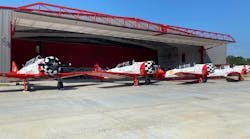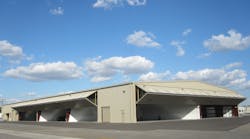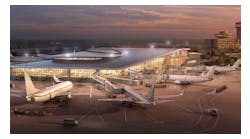Mike Schweiss Inducted into Minnesota Aviation Hall of Fame
The concept of human flight is virtually as old as humankind. Ever since man first walked the earth, he has dreamed of ascending above it.
Mike Schweiss, founder of Schweiss Doors in Hector, Minn., fulfilled a piece of those dreams with his first solo flight behind the controls of a Cessna 172 in 1991. Although he continued to fly after earning his license, Schweiss was sidetracked with an occupation that gave a distinct boost to the world of aviation.
It’s been said that necessity is the mother of invention. Alfred North Whitehead took that one step further, saying “The greatest invention of the 19th century was the invention of the method of invention.”
Knowing that Schweiss was continually coming up with various, mostly agricultural-related manufacturing projects such as farrowing crates and the well-known Chicken Plucker, from his home farm eight miles south of Hector, an acquaintance suggested one evening at a wedding dance, that Schweiss should consider building a bifold door. Ironic as it may seem, that man died soon after on the dance floor that evening, but the lightbulb that glowed in Schweiss' mind kept burning bright. And so, ideas churning within his ever-enlightened brain, the bifold door came to fruition a few years later, followed by a one-piece hydraulic door and a line of bifold and hydraulic Designer Doors.
Along the way, Schweiss continued to make significant improvements on his design, notably among those was the advent of the patented liftstrap bifold door that quickly outsold cable-lift doors. What started out as a two-man operation in what was once a milking parlor, has grown to a 250,000 square foot facility, covering 30 acres. The family-owned business now employs about 65 year-round jobs and delivers doors to every continent in the world.
It soon became apparent that Schweiss' doors were not only suited for agricultural, industrial and residential uses, but would fill a very much needed product for aviation hangars; a much better option than cumbersome sliding doors that were especially difficult to open during winter months. These custom doors, offering no loss of headroom, leave the factory daily and are shipped worldwide in sizes big and small with the tallest hangar door installed on a rocket hangar at Cape Canaveral, Fla., that spans 90 feet wide by 60 feet tall.
Schweiss took center stage April 20, during the 34th annual Minnesota Aviation Hall of Fame Induction ceremony at Mystic Lake Hotel and Casino in Prior Lake, Minn. He was inducted with an illustrious group of six other aviation personalities who made a significant contribution to the progress and development of aviation in Minnesota and elsewhere.
Six months after the bifold idea was born, Schweiss started production of his first bifold door that ended up on a small county building.
Always a family man, for his acceptance speech, Schweiss took the stage with one of his granddaughters, Cora Mead.
“The first year we sold one or two doors, but we just kept trying and trying, and now our doors go all over the world,” Schweiss said. “I asked one of my installers one day if he would like to supervise an install. He asked where I was sending him. I told him Dubai. When he asked where that was, I told him it was on the other side of Minneapolis!
“When we got going manufacturing doors, people would call and say, ‘I’ve got a hangar, can you come and look at it?’ I got keen to it and said if you fly here to the Hector airport, I won’t charge you anything for my time. I got a lot of free plane rides and thought that was great – I was in a lot of different planes. One day, a guy called up and said he had some bad news … ‘The plane I was going to bring you is not going to work, I’ll bring my Citation.’ I said, ‘No problem. You can land in Hutchinson or New Ulm.’ I told my brother, Dave, ‘I’m going to forfeit this ride to you.’ So, Dave got the first jet ride in the family.
“It’s been a good run and family operation with my grandchildren with us every day. I want to thank my family, friends and customers and thank you for this high honor.”
The dinner was to honor the inductees as well as present annual scholarships to youth engaged in aviation studies or flight training.
Other 2024 Inductees
Curtis Brown Jr. is a member of the U.S. Astronaut Hall of Fame who participated as a crewmember of six space shuttle missions among many other accolades.
Stevan Petrich, who passed away in 2022, was well known as a North Central and Delta airlines pilot. But he was drawn to floatplanes and discovered there was a need for equipment related to that industry. His catalog business was later purchased by Whipaire.
Cherise “Cheri” Rohlfing pursued a degree in aviation, becoming a flight instructor, moving forward, flying corporate jets prior to flying for Northwest Airlines. One of her most noted achievements was with Delta Airlines in creation of Woman Inspiring our Next Generation (WING) Flight, designed to inspire female high school students to explore careers in aviation.
The wife of William “Pat” Magie III was present to accept the award on his behalf. Pat, who passed on 2022, used his GI Bill to take flying lessons in 1952 and along with his love of seaplanes, opened Wilderness Wings Airways in Ely, Minn. He went on to instruct hundreds of young pilots who went on to make a career in aviation. Over the years, he owned 488 aircraft and had logged over 40,000 hours of flight time.
Jonathon “Max” Haynes, who passed away in 2022, made a name for himself as a skilled air-to-air photographer and artist. He photographed numerous annual Hero Flights and documented the creation of the Red Tail Squadron and Women’s Air Force Service Pilots (WASP) community and its “Rise Above” traveling exhibit. He took part in the creation of 16 books to inspire young people to become authors and illustrators.
Paul Dye, born in Bemidji, Minn., began flying as a teenager and went on to earn a degree in Aeronautic Engineering, specializing in aircraft design and flight testing. He went on to Houston to join the NASA Manned Spaceflight Program, working on shuttle orbiter systems. He was flight director for the first shuttle to rendezvous with the Soviet/Russian space station, MIR, in 1995.





